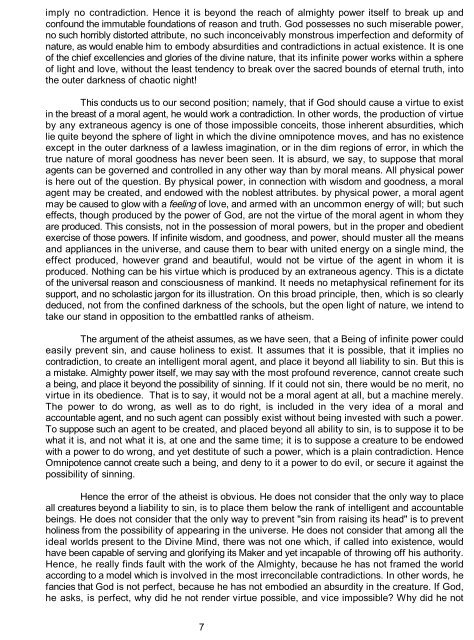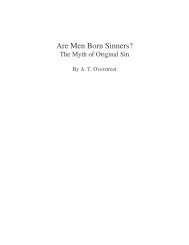Foreknowledge by Joel Hayes - Library of Theology
Foreknowledge by Joel Hayes - Library of Theology
Foreknowledge by Joel Hayes - Library of Theology
Create successful ePaper yourself
Turn your PDF publications into a flip-book with our unique Google optimized e-Paper software.
imply no contradiction. Hence it is beyond the reach <strong>of</strong> almighty power itself to break up and<br />
confound the immutable foundations <strong>of</strong> reason and truth. God possesses no such miserable power,<br />
no such horribly distorted attribute, no such inconceivably monstrous imperfection and deformity <strong>of</strong><br />
nature, as would enable him to embody absurdities and contradictions in actual existence. It is one<br />
<strong>of</strong> the chief excellencies and glories <strong>of</strong> the divine nature, that its infinite power works within a sphere<br />
<strong>of</strong> light and love, without the least tendency to break over the sacred bounds <strong>of</strong> eternal truth, into<br />
the outer darkness <strong>of</strong> chaotic night!<br />
This conducts us to our second position; namely, that if God should cause a virtue to exist<br />
in the breast <strong>of</strong> a moral agent, he would work a contradiction. In other words, the production <strong>of</strong> virtue<br />
<strong>by</strong> any extraneous agency is one <strong>of</strong> those impossible conceits, those inherent absurdities, which<br />
lie quite beyond the sphere <strong>of</strong> light in which the divine omnipotence moves, and has no existence<br />
except in the outer darkness <strong>of</strong> a lawless imagination, or in the dim regions <strong>of</strong> error, in which the<br />
true nature <strong>of</strong> moral goodness has never been seen. It is absurd, we say, to suppose that moral<br />
agents can be governed and controlled in any other way than <strong>by</strong> moral means. All physical power<br />
is here out <strong>of</strong> the question. By physical power, in connection with wisdom and goodness, a moral<br />
agent may be created, and endowed with the noblest attributes. <strong>by</strong> physical power, a moral agent<br />
may be caused to glow with a feeling <strong>of</strong> love, and armed with an uncommon energy <strong>of</strong> will; but such<br />
effects, though produced <strong>by</strong> the power <strong>of</strong> God, are not the virtue <strong>of</strong> the moral agent in whom they<br />
are produced. This consists, not in the possession <strong>of</strong> moral powers, but in the proper and obedient<br />
exercise <strong>of</strong> those powers. If infinite wisdom, and goodness, and power, should muster all the means<br />
and appliances in the universe, and cause them to bear with united energy on a single mind, the<br />
effect produced, however grand and beautiful, would not be virtue <strong>of</strong> the agent in whom it is<br />
produced. Nothing can be his virtue which is produced <strong>by</strong> an extraneous agency. This is a dictate<br />
<strong>of</strong> the universal reason and consciousness <strong>of</strong> mankind. It needs no metaphysical refinement for its<br />
support, and no scholastic jargon for its illustration. On this broad principle, then, which is so clearly<br />
deduced, not from the confined darkness <strong>of</strong> the schools, but the open light <strong>of</strong> nature, we intend to<br />
take our stand in opposition to the embattled ranks <strong>of</strong> atheism.<br />
The argument <strong>of</strong> the atheist assumes, as we have seen, that a Being <strong>of</strong> infinite power could<br />
easily prevent sin, and cause holiness to exist. It assumes that it is possible, that it implies no<br />
contradiction, to create an intelligent moral agent, and place it beyond all liability to sin. But this is<br />
a mistake. Almighty power itself, we may say with the most pr<strong>of</strong>ound reverence, cannot create such<br />
a being, and place it beyond the possibility <strong>of</strong> sinning. If it could not sin, there would be no merit, no<br />
virtue in its obedience. That is to say, it would not be a moral agent at all, but a machine merely.<br />
The power to do wrong, as well as to do right, is included in the very idea <strong>of</strong> a moral and<br />
accountable agent, and no such agent can possibly exist without being invested with such a power.<br />
To suppose such an agent to be created, and placed beyond all ability to sin, is to suppose it to be<br />
what it is, and not what it is, at one and the same time; it is to suppose a creature to be endowed<br />
with a power to do wrong, and yet destitute <strong>of</strong> such a power, which is a plain contradiction. Hence<br />
Omnipotence cannot create such a being, and deny to it a power to do evil, or secure it against the<br />
possibility <strong>of</strong> sinning.<br />
Hence the error <strong>of</strong> the atheist is obvious. He does not consider that the only way to place<br />
all creatures beyond a liability to sin, is to place them below the rank <strong>of</strong> intelligent and accountable<br />
beings. He does not consider that the only way to prevent "sin from raising its head" is to prevent<br />
holiness from the possibility <strong>of</strong> appearing in the universe. He does not consider that among all the<br />
ideal worlds present to the Divine Mind, there was not one which, if called into existence, would<br />
have been capable <strong>of</strong> serving and glorifying its Maker and yet incapable <strong>of</strong> throwing <strong>of</strong>f his authority.<br />
Hence, he really finds fault with the work <strong>of</strong> the Almighty, because he has not framed the world<br />
according to a model which is involved in the most irreconcilable contradictions. In other words, he<br />
fancies that God is not perfect, because he has not embodied an absurdity in the creature. If God,<br />
he asks, is perfect, why did he not render virtue possible, and vice impossible? Why did he not<br />
7






